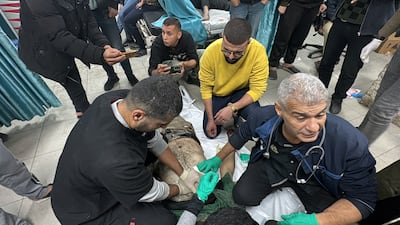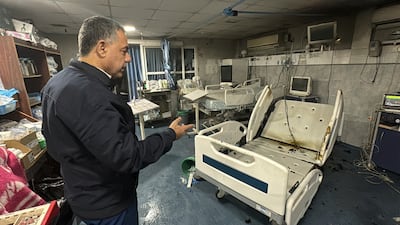Live updates: Follow the latest on Israel-Gaza
Israel detonated explosives carried by robots outside of northern Gaza's Kamal Adwan and Indonesian hospitals, both of which have been nearly completely emptied of doctors and patients.
Speaking to The National on Wednesday, Kamal Adwan hospital director Dr Hossam Abu Safiyeh, who remained inside the facility, said the scenes had been terrifying as Israel claims to be targeting Hamas militants.
“Since Tuesday, robots have been advancing near the hospital, unloading explosive boxes that are detonated hours later, causing panic, fear, and significant damage to the hospital,” he said.
At least 20 people, including five medical staff members, have been injured while inside the hospital as a result.
“These explosions have destroyed all barriers within the hospital, blown out interior doors and windows, and inflicted severe damage," said Dr Abu Safiyeh.
In a statement to The National, the Israeli military denied placing "explosive robots" or any type of explosives at the entrance to Kamal Adwan hospital.
Dr Abu Safiyeh said the hospital's generators had not been spared from attacks. Targeted by Israeli drones, the facility has been left without power for days, with water shortages due to destroyed rooftop water tanks compounding the already desperate conditions inside the hospital. Stepping outside the hospital's walls to fix anything was not an option, he said.
“Anyone moving within the hospital courtyard is immediately targeted by bombs dropped from drones that continuously hover over the hospital without pause."
At least 65 injured people remain in the hospital, all in urgent need of medical attention. “Without intervention, they risk losing their lives,” he warned.
Even while some critical cases are being evacuated to Gaza city hospitals in collaboration with the World Health Organisation, the needs are far too high. “We need intensified efforts to save as many patients as possible,” he said.
“We call for the establishment of a safe corridor to bring in essential supplies and aid to protect healthcare workers and the healthcare system from direct targeting and attacks.”
The Indonesian hospital has been under a similarly brutal siege. A nurse who preferred to remain anonymous recounted the harrowing experience of being forced to leave under Israeli orders.

“Early Tuesday morning, the Israeli army began surrounding the hospital with vehicles from all directions, accompanied by intense air strikes, and ordered us to evacuate. After security checks were performed on injured patients, their companions, and medical staff, we were forced to leave.”
Moving the sick and wounded was nearly impossible, the nurse said.
“Israeli forces did not provide any means for transporting the injured, leaving them to walk long distances in the freezing cold. Some were carried on shoulders because they could not walk.”
The displaced covered a distance of approximately four kilometres to reach areas with ambulances and civilian vehicles. Those injured were then transferred to Al Shifa hospital in Gaza city, while displaced individuals were scattered across the city.
“During the siege at the Indonesian Hospital, we endured catastrophic conditions, suffering from severe shortages of water, food, and medicine. There were no basic necessities for survival,” the nurse told The National.
The Israeli army’s control over the hospital was marked by restrictions that prevented anyone from leaving the facility. The nurse recounted feeling trapped by the threat of death, similar to Dr Safiyeh's description. "Those who tried to leave were shot at by Israeli drones that continuously hovered over the hospital from all directions."
Israeli forces have, in recent days, intensified their targeting of Al Awda Hospital, bombing the third floor and causing damage and injuries. Military vehicles later surrounded the hospital, although they did not storm the building. Hours later, they withdrew.
Moumen Abu Hazaa remains trapped there with his injured brother. He has been in Al Awda since the beginning of the Israeli siege on northern Gaza in October.
“We are living under catastrophic conditions in the hospital, enduring daily bombardments by various means. The occupation deliberately targets any moving object near the hospital entrance, leaving many martyrs and bodies lying in the streets,” he said.
“Last night, the occupation detonated several robots planted around the hospital, destroying dozens of homes, damaging parts of the hospital, and spreading panic among patients, caregivers, and medical staff."
West Bank raids
In the occupied West Bank, Israel expanded its raids on Christmas day, launching attacks in Nablus after killing eight people in Tulkarm, including two women, on Tuesday night, Palestinian officials said.
The Israeli army said it "eliminated a terrorist" in Tulkarm.
Speaking to The National, head of the doctors' syndicate Dr Radwan Balibla said residents of the Tulkarm and Nur Al Shams refugee camps have been "without water or electricity" since the Israeli raids started two days ago.
"There is unprecedented destruction to the infrastructure and homes where many have been blown up – including ones that belong to families of martyrs," he said.
The siege has prevented people from being able to leave their homes, including those who need medical assistance, as Israeli forces blocked ambulances from entering the camp, the official news agency Wafa reported.

